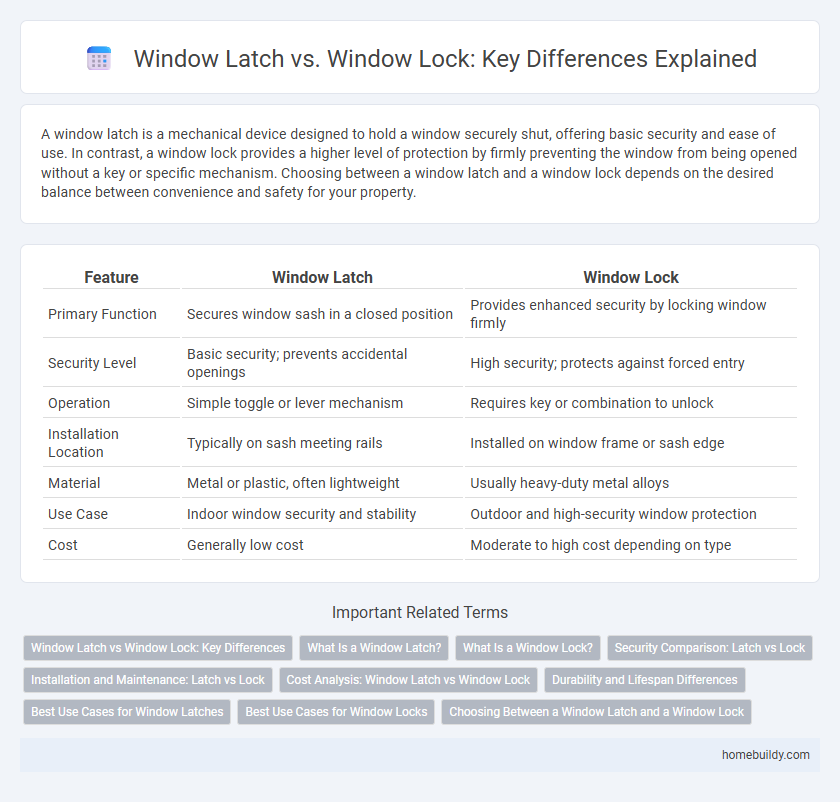A window latch is a mechanical device designed to hold a window securely shut, offering basic security and ease of use. In contrast, a window lock provides a higher level of protection by firmly preventing the window from being opened without a key or specific mechanism. Choosing between a window latch and a window lock depends on the desired balance between convenience and safety for your property.
Table of Comparison
| Feature | Window Latch | Window Lock |
|---|---|---|
| Primary Function | Secures window sash in a closed position | Provides enhanced security by locking window firmly |
| Security Level | Basic security; prevents accidental openings | High security; protects against forced entry |
| Operation | Simple toggle or lever mechanism | Requires key or combination to unlock |
| Installation Location | Typically on sash meeting rails | Installed on window frame or sash edge |
| Material | Metal or plastic, often lightweight | Usually heavy-duty metal alloys |
| Use Case | Indoor window security and stability | Outdoor and high-security window protection |
| Cost | Generally low cost | Moderate to high cost depending on type |
Window Latch vs Window Lock: Key Differences
A window latch is a mechanical fastener that secures a window sash by holding it closed, typically operated manually without a key, while a window lock provides enhanced security by requiring a key or combination to engage or disengage. Window latches are designed primarily for ease of use and basic safety against accidental openings, whereas window locks focus on preventing unauthorized access and increasing home security. Choosing between a window latch and a window lock depends on the balance between convenience and security needs.
What Is a Window Latch?
A window latch is a mechanical device designed to secure a window closed by engaging two separate parts firmly, ensuring stability and preventing accidental opening. Unlike a window lock, which typically provides enhanced security against forced entry through keyed or combination mechanisms, a window latch primarily offers basic closure and safety features. Window latches are commonly used in sliding, casement, and double-hung windows to maintain operational control and prevent drafts.
What Is a Window Lock?
A window lock is a security device designed to prevent windows from being opened from the outside, enhancing home safety. Unlike a window latch, which primarily keeps a window closed, a window lock typically offers a more robust mechanism that can be keyed or have a pin system for added protection. Effective window locks are essential for securing accessible windows, deterring break-ins, and ensuring child safety.
Security Comparison: Latch vs Lock
Window latches provide basic security by securing the sash in place, preventing the window from being easily opened, while window locks offer enhanced protection through mechanical or keyed locking mechanisms that resist forced entry. Locks are often constructed from sturdier materials and include features like deadbolts or key access, making them more effective against break-ins compared to standard latches. For maximum security, combining a reliable window lock with a latch system ensures both convenience and high resistance to unauthorized access.
Installation and Maintenance: Latch vs Lock
Window latches are typically easier to install, requiring only basic tools and minimal hardware, making them ideal for quick setups or DIY projects. Maintenance for window latches involves regular cleaning and occasional lubrication to ensure smooth operation, while window locks may require more detailed inspection due to complex mechanisms. Locks, on the other hand, often need professional installation to guarantee proper alignment and security, and their maintenance includes checking key components and ensuring no corrosion or wear impairs functionality.
Cost Analysis: Window Latch vs Window Lock
Window latches typically cost between $5 and $15, making them a budget-friendly option for securing windows with basic functionality. Window locks, on the other hand, range from $20 to $50 or more, reflecting their enhanced security features and durability. When factoring in installation expenses and long-term reliability, window locks represent a higher initial investment but offer greater protection and potential savings on home insurance premiums.
Durability and Lifespan Differences
Window latches typically feature simpler mechanisms and are made from lightweight materials, resulting in a shorter lifespan and moderate durability compared to window locks. Window locks often utilize sturdier metals like steel or brass, enhancing resistance to wear and increasing overall longevity. Choosing window locks ensures extended durability and improved security over the basic functionality of window latches.
Best Use Cases for Window Latches
Window latches are ideal for securing windows that require quick and easy locking mechanisms, such as frequently opened or ventilated spaces. They offer a straightforward solution for holding windows closed without the complexity or bulk of a lock, making them perfect for lightweight or interior windows. Compared to window locks, latches are best suited for areas where convenience and moderate security are prioritized over high-level protection.
Best Use Cases for Window Locks
Window locks provide enhanced security by preventing unauthorized access and are best suited for high-risk areas such as ground-floor windows or accessible bedrooms. They offer a stronger physical barrier compared to window latches, which primarily serve to keep windows slightly ajar for ventilation without compromising safety. For securing family homes, retail storefronts, or offices, window locks ensure optimal protection against break-ins while maintaining ease of use.
Choosing Between a Window Latch and a Window Lock
Choosing between a window latch and a window lock depends on the level of security and convenience needed. Window latches provide basic functionality for keeping windows closed and are easy to operate, making them ideal for ventilation and quick access. Window locks, however, offer enhanced security by preventing unauthorized opening, often featuring keyed or tamper-resistant mechanisms suitable for homes requiring higher protection.
window latch vs window lock Infographic

 homebuildy.com
homebuildy.com